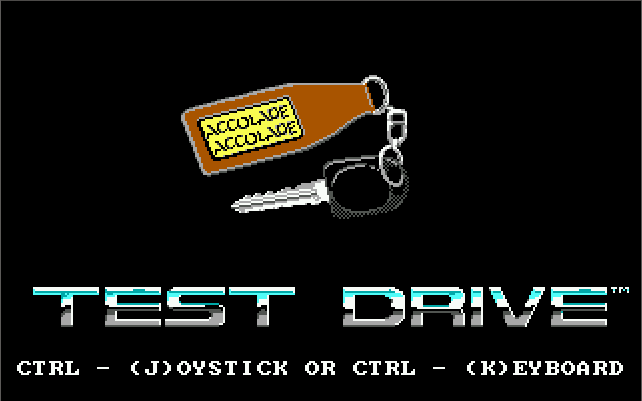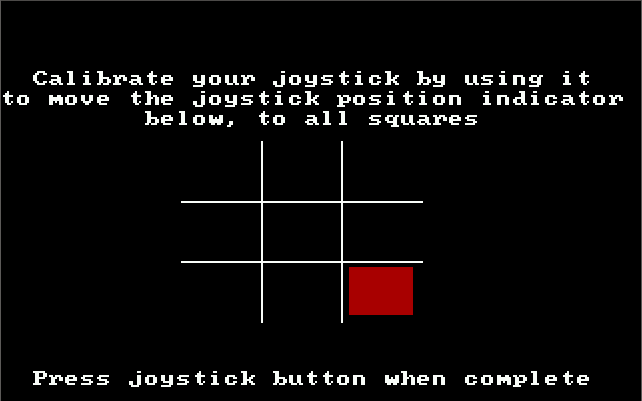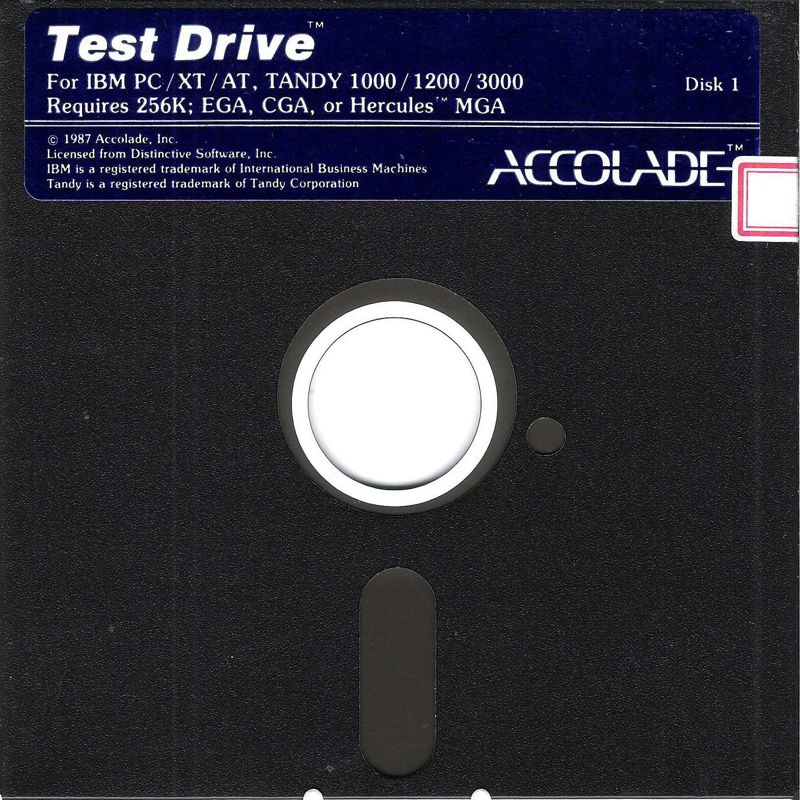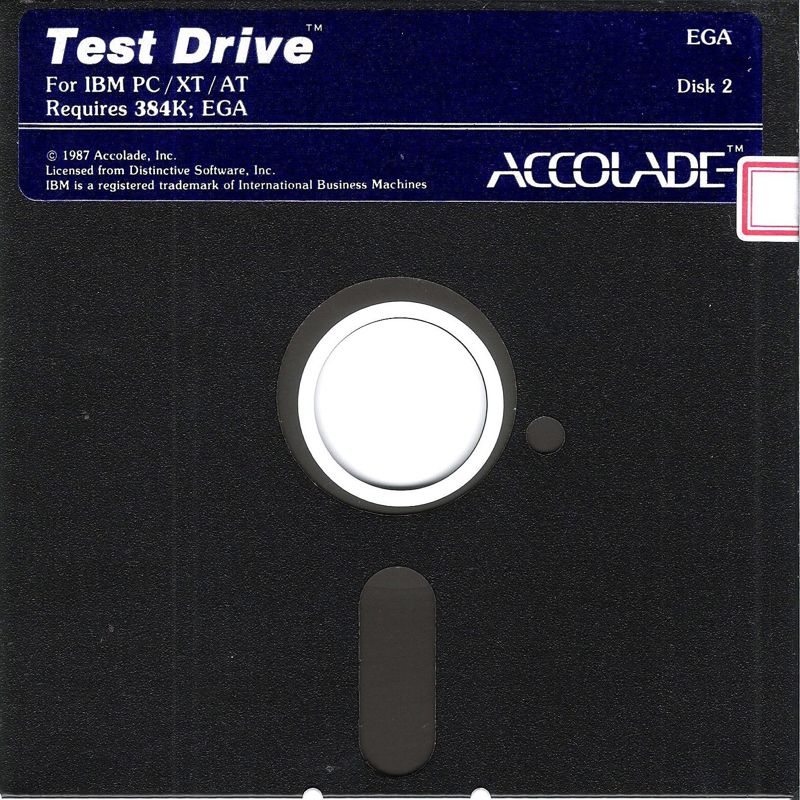 Test Drive
Test Drive
Released: 1987
Published by: Accolade, Inc.
Developed by: Distinctive Software
Author(s): Mike Benna, Rick Friesen, Bruce Dawson, Don Mattrick, Brad Gour, Kevin Pickell, Amory Wong, John Boechler, Tony Lee, Rick Millson, Patrick Payne
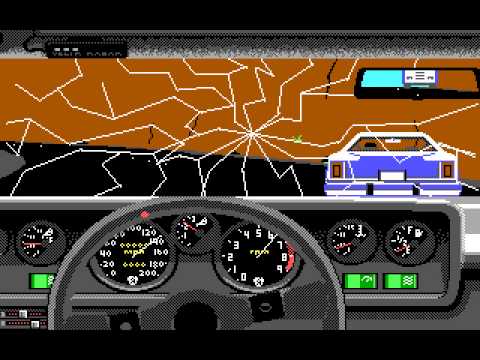
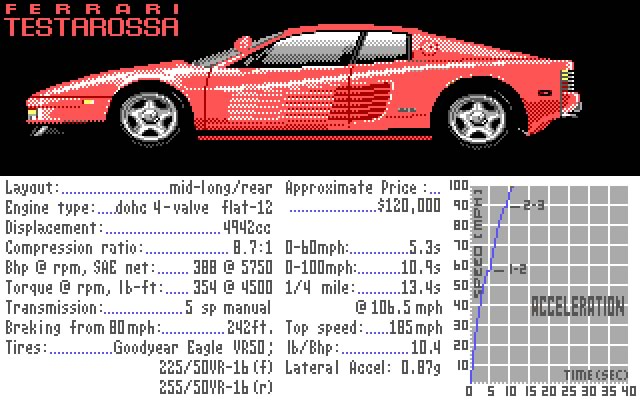
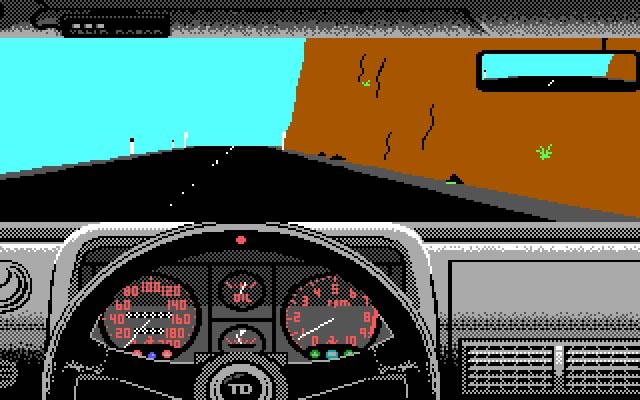
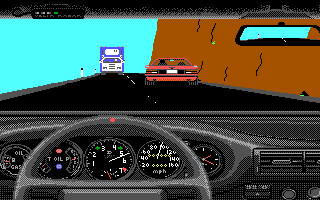
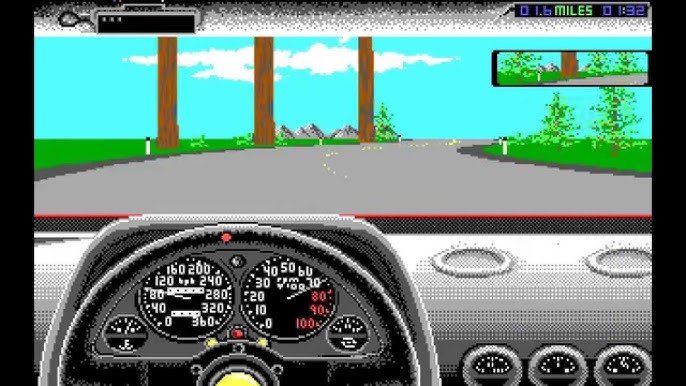
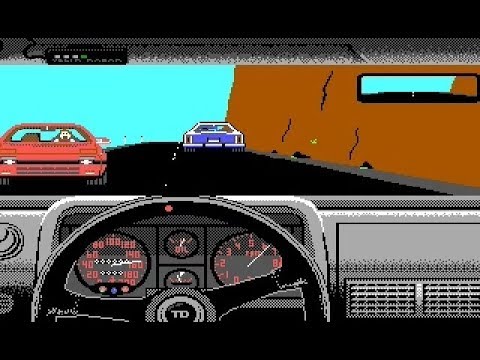
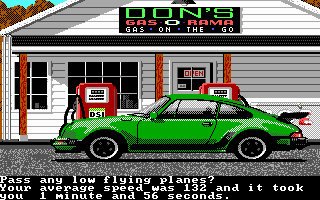
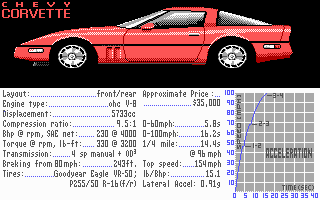
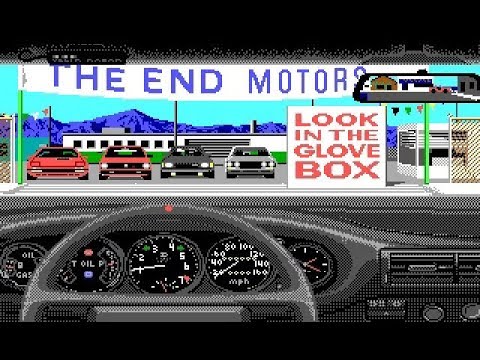
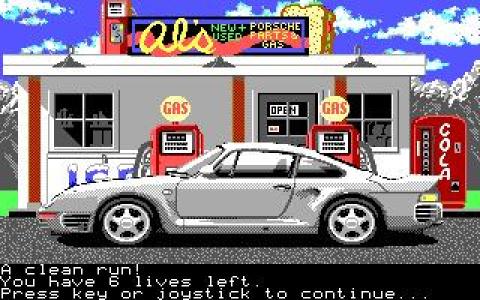
16-colour EGA graphics
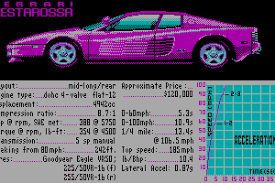
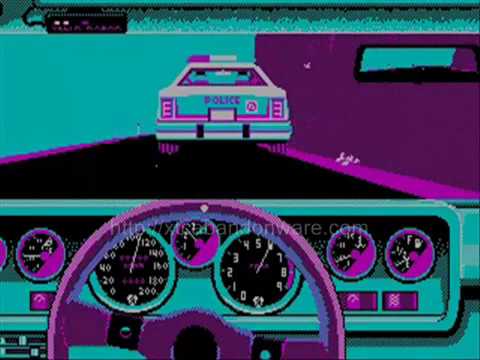
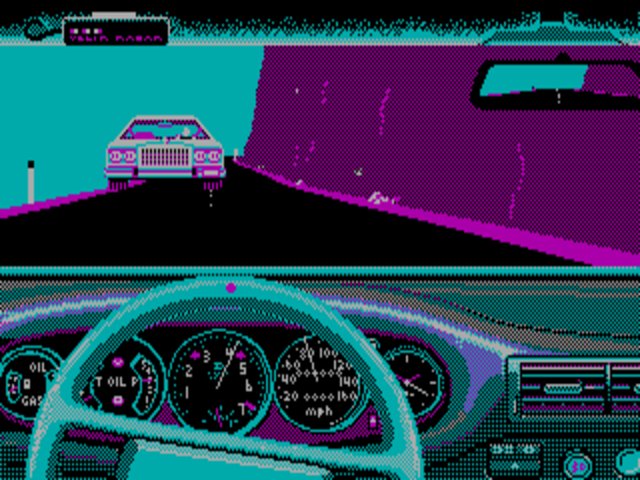
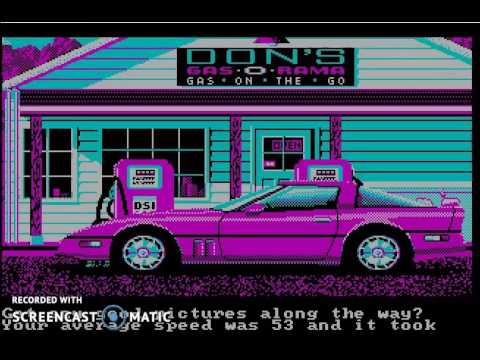
4-colour CGA graphics
Introduction
Electronic Arts began as a software house back in 1982 on the 8-bit home computers, but they didn't try their hand at a 'simulator' until 1987 with the release of Test Drive. Simulators of all kinds in this era were pretty basic, and this game was no exception. However, the concept of being behind the wheel of a supercar was pretty new. Test Drive hands you the key to 5 sports cars - the Chevrolet Corvette C4, Ferrari Testarossa, Lamborghini Countach, Lotus Esprit, and the Porsche 911 Turbo. Given that these are road-legal vehicles means you're out on the streets, or more specifically you're on a mountain pass.
The aim of the game is to drive through five stages in the fastest time possible. The police are out in force, ready to stop any drivers with a heavy right foot and give you a speeding ticket which acts as a time penalty. Each car has a radar detector at the top of the screen that indicates when you're getting picked up on the police scanner - this gives you an idea of the distance between you and the cops. Get stopped too many times and it's game over, so you have to decide whether it's worth your while trying to outrun them or pull over and face the penalty. It's all done very well, and adds to the fun of the game.
As you navigate along the mountain road you will be faced with traffic in both directions, in addition to other natural hazards like simply falling over the edge or hitting fallen rocks.
You have only the option for manual gears, so you need to move the joystick in the direction of the chosen gear as it would be in the gait, which appears as a small window in the lower right corner, or if using keys use 'A' and 'Z' to move up/down a gear. You will blow your engine if you over-rev (note that you start in neutral)! This gives a slightly added sense that the designers wanted Test Drive to be more simulation than arcade racer.
The PC version retailed for $39.95, and was also released at the same time for the Commodore 64, Apple II, Amiga, and Atari ST. The game came on two 5.25" floppy disks but you could send off a voucher and $5 to get a single 3.5" disk version. Test Drive was succeeded by Test Drive II: The Duel in 1989, Test Drive III: The Passion in 1990, and many more that took the series well past the DOS era.
System Requirements
| System Requirements | Intel 8088/8086 CPU, (anything 286 or better is ideal), 256 KB (384 KB required for EGA or Tandy modes) Graphics support for Hercules, CGA, Tandy/PCjr (4-colour), and EGA (320 x 200 in 16 colours). Audio support for PC speaker only. Keyboard and joystick are supported. |
|---|---|
| Original Media | Two 5.25" DS/DD 360 KB floppy disks or One 3.5" 720 KB floppy disk. |
| Installed Size | 645 KB |
From where can it be run?
The game can be run from the floppy disks, or installed to hard disk by running the HDINST.EXE utility.
Copy Protection
Original Test Drive floppy disks used "key" disk copy protection, where a specific sector had an incorrect sector ID.
How to Setup
Given the age of the game, there is no setup utility to configure graphics and sound. When you first start the game by running TD.EXE, you are requested to choose a graphics option:
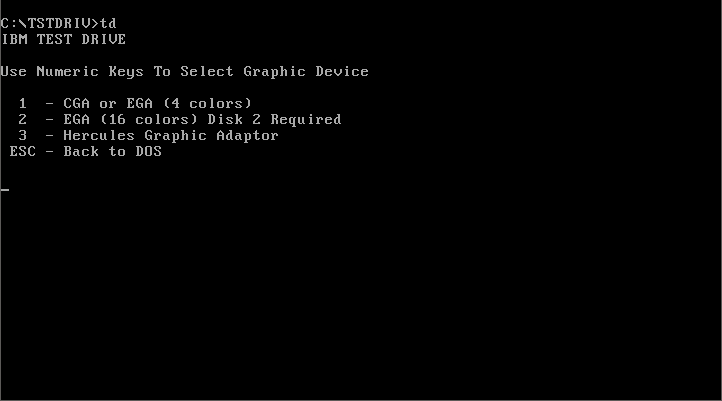
Then from the startup screen, you can choose either joystick with CTRL-J or keyboard control with CTRL-K:
If you choose joystick control, you are then presented with a joystick calibration screen:
I personally found calibrating my CH Mach I joystick difficult. This may be due to the age of the hardware (I've not opened it up and cleaned it), but the calibration failed to remain steady on the three right boxes. You really do need to get this working well before playing the game.
Problems
There are no known problems playing Test Drive.
Keys
Arrow left/right= Steer left/right |
D = Display/hide the gearstick |
To Quit the Game
Press ESC to go back to the main Test Drive intro, then hit ESC again followed by "Y" to exit to DOS.

Supporting Documents
Save Games
There is no opportunity to save your progress in TD. If you exit the game, you will lose your progress. However, when you complete the mountain pass in a good time you are asked to enter your name into the high score table. This data is stored in a file called SCORES in the game directory (by default, the root directory of disk 1). It is text-readable and editable.
Versions of the game known to exist
| Version | Date | Comments |
|---|---|---|
| 1.0 | 1987 | Initial public release. |
| 1.1 | 9 Nov 1987 | Unsure what the differences are. Only 1 additional file, called FIXIN.EXE, which is something to do with the hard disk installer. |
Original Floppy Disk Contents (v1.1)
The floppy disks have no specific volume label. As was typical for the era, a number of files are duplicated over both disks to cut down on the need to swap disks during the game. Here are each disk's contents:
Disk 1 of 2 - (5.25" 360 KB DS/DD):
Directory of A:\ ACCOLADE CMP 2,713 09-11-1987 13:42 CARS TXT 37 21-10-1987 14:09 COUNTA BIN 1,238 24-10-1987 21:56 COUNTA CMP 11,391 09-11-1987 13:41 COUNTA SS 97 09-11-1987 11:26 COUNTASB CMP 20,218 10-11-1987 14:09 FIXIN EXE 13,185 10-10-1988 10:53 GAS CMP 11,530 09-11-1987 13:43 HDINST EXE 11,414 19-10-1987 12:28 HINSTAL2 BAT 578 13-11-1987 10:41 HINSTALL BAT 562 12-11-1987 13:32 LLOGO CMP 12,097 09-11-1987 13:42 LOTUS BIN 1,238 24-10-1987 21:56 LOTUS CMP 10,484 09-11-1987 13:40 LOTUS SS 97 06-10-1987 11:51 LOTUSSB CMP 14,382 09-11-1987 13:40 P911T BIN 1,238 24-10-1987 21:45 P911T CMP 10,507 09-11-1987 13:40 P911T SS 97 06-10-1987 11:52 P911TSB CMP 15,369 09-11-1987 13:40 ROSSA BIN 1,238 24-10-1987 21:55 ROSSA CMP 10,785 09-11-1987 13:41 ROSSA SS 97 06-10-1987 11:51 ROSSASB CMP 16,211 10-11-1987 4:46 SCORES 392 24-10-1987 15:06 SLOGO CMP 1,756 09-11-1987 13:42 TD EXE 17,871 10-11-1987 4:51 TDCGA EXE 57,856 17-11-1987 21:21 TDSND SND 2,679 25-10-1987 14:55 TESTDRV CMP 15,714 09-11-1987 13:42 VETTE BIN 816 24-10-1987 21:54 VETTE CMP 10,340 09-11-1987 13:41 VETTE SS 97 06-10-1987 11:52 VETTESB CMP 15,705 09-11-1987 13:41 XROADA CMP 16,241 09-11-1987 13:42 XROADB CMP 28,282 09-11-1987 13:42 36 File(s) 334,552 Bytes |
|
Disk 2 of 2 (5.25" 360 KB DS/DD):
Directory of A:\ ACCOLADE PES 2,197 09-11-1987 14:31 CARS TXT 37 21-10-1987 14:09 COUNTA BIN 1,238 24-10-1987 21:56 COUNTA PES 11,923 09-11-1987 14:28 COUNTA SS 97 09-11-1987 11:26 COUNTASB PES 24,486 09-11-1987 14:29 GAS PES 16,211 09-11-1987 14:36 LLOGO PES 14,793 09-11-1987 14:33 LOTUS BIN 1,238 24-10-1987 21:56 LOTUS PES 11,760 09-11-1987 14:15 LOTUS SS 97 06-10-1987 11:51 LOTUSSB PES 15,265 09-11-1987 14:16 P911T BIN 1,238 24-10-1987 21:45 P911T PES 11,610 09-11-1987 14:17 P911T SS 97 05-11-1987 12:05 P911TSB PES 15,915 09-11-1987 14:18 ROSSA BIN 1,238 24-10-1987 21:55 ROSSA PES 11,497 09-11-1987 14:30 ROSSA SS 97 06-10-1987 11:51 ROSSASB PES 20,718 09-11-1987 14:31 SCORES 392 24-10-1987 15:06 SLOGO PES 1,876 09-11-1987 14:33 TDEGA EXE 66,517 10-11-1987 7:34 TDH EXE 17,807 12-11-1987 10:42 TDSND SND 2,679 25-10-1987 14:55 TESTDRV PES 17,801 09-11-1987 14:32 VETTE BIN 816 24-10-1987 21:54 VETTE PES 10,491 09-11-1987 14:26 VETTE SS 97 06-10-1987 11:52 VETTESB PES 17,003 09-11-1987 14:27 XROADA PES 16,517 09-11-1987 14:35 XROADB PES 10,585 09-11-1987 14:35 XROADC PES 11,800 10-11-1987 1:35 33 File(s) 336,133 Bytes |
|
Game Review
Electronic Arts began as a software house back in 1982 on the 8-bit home computers, but they didn't try their hand at a 'simulator' until 1987 with the release of Test Drive. Simulators of all kinds in this era were pretty basic, and this game was no exception. However, the concept of being behind the wheel of a supercar was pretty new. Test Drive hands you the key to 5 sports cars - the Chevrolet Corvette, Ferrari Testarossa, Lamborghini Countach, Lotus Esprit, and the Porsche 911. Given that these are road-legal vehicles means you're out on the streets, or more specifically you're on a mountain pass. The Lotus, Porsche and Chevrolet are the slowest, and the Lamborghini and Ferrari are the fastest. The Porsche is the fastest to 60 mph though in reality there's not much difference you can see when driving.
 The aim of the game is to drive through five levels in the fastest time possible. The police are out in force, ready to stop any drivers with a heavy right foot and give you a speeding ticket which acts as a time penalty. Each car has a radar detector at the top of the screen that indicates when you're getting picked up on the police scanner - this gives you an idea of the distance between you and the cops. Get stopped too many times and it's game over, so you have to decide whether it's worth your while trying to outrun them or pull over and face the penalty. It's all done very well, and adds to the fun of the game.
The aim of the game is to drive through five levels in the fastest time possible. The police are out in force, ready to stop any drivers with a heavy right foot and give you a speeding ticket which acts as a time penalty. Each car has a radar detector at the top of the screen that indicates when you're getting picked up on the police scanner - this gives you an idea of the distance between you and the cops. Get stopped too many times and it's game over, so you have to decide whether it's worth your while trying to outrun them or pull over and face the penalty. It's all done very well, and adds to the fun of the game.
As you navigate along the mountain road you will be faced with traffic in both directions, in addition to other natural hazards like simply falling over the edge or hitting fallen rocks.
You have the choice of manual gears only, and you must move the joystick in the direction of the chosen gear as it would be in the gait, which appears as a small window in the lower right corner. This gives a slightly added sense that the designers wanted Test Drive to be more simulation than arcade racer.
 Graphically the game was a mix. The car selection screens are well presented with a lot of each car's specifications and torque curves shown, and in-game the dashboard of each of the five cars reflects that actual layout of the real thing; little details like the Corvette's digital speedo add to the sense you are in that actual car. Sadly the view out of the windscreen is pretty hamstrung - the venerable IBM PC in 1987 really was still a business machine first and foremost, and had several graphics standards that any games developer would need to support to reach the largest audience. Test Drive runs happily on an XT (8088 or 8086) with graphics support for Hercules, CGA, Tandy/PCjr and EGA. This means 320 x 200 resolution in 16 colours is the best you're going to get.
Graphically the game was a mix. The car selection screens are well presented with a lot of each car's specifications and torque curves shown, and in-game the dashboard of each of the five cars reflects that actual layout of the real thing; little details like the Corvette's digital speedo add to the sense you are in that actual car. Sadly the view out of the windscreen is pretty hamstrung - the venerable IBM PC in 1987 really was still a business machine first and foremost, and had several graphics standards that any games developer would need to support to reach the largest audience. Test Drive runs happily on an XT (8088 or 8086) with graphics support for Hercules, CGA, Tandy/PCjr and EGA. This means 320 x 200 resolution in 16 colours is the best you're going to get.
 Sound is one negative aspect of Test Drive. Only the PC speaker is supported, since the Ad Lib sound card didn't arrive until later on this same year. Still, Electronic Arts did what they could, with engine sounds, tyres squealing if you attempt to corner too fast, and the police car sirens. I've heard worse from the PC speaker, so it's best to just accept this was normal PC gaming life in 1987.
Sound is one negative aspect of Test Drive. Only the PC speaker is supported, since the Ad Lib sound card didn't arrive until later on this same year. Still, Electronic Arts did what they could, with engine sounds, tyres squealing if you attempt to corner too fast, and the police car sirens. I've heard worse from the PC speaker, so it's best to just accept this was normal PC gaming life in 1987.
Is the game still fun to play in 2023? I'd have to say no. Unless you have a good dose of nostalgia for the game, it's tough to get past the rudimentary 16-colour graphics and PC speaker music and sound effects today. Test Drive will go down in history almost as the grandfather of the car driving simulation, but it hasn't aged well. If you're going to try Test Drive my recommendation is to skip it and load up the sequel, Test Drive II: The Duel, along with the expansion packs that give you more 'tracks' and cars, as well as direct competition against a computer opponent.
Sound: Not great, but it's of its time with PC speaker sound only, and no 3-voice audio for Tandy owners. Given this hardware limitation the intro music and in-race sounds are acceptable. It would have been great if Distinctive Software had released an Ad Lib patch for Test Drive after the event, but I guess the game was too hard-coded in this area to make it viable. 1/10
Gameplay: Still more arcade than sim, what would otherwise make Test Drive relatively boring is spiced up with the police chases and risk of getting tickets. There is no AI to speak of - cars just appear randomly to get in your way. The choice of using a joystick is a nice addition, though I personally prefer using the keys. 4/10
Lastability: Sadly only one 'track' is available (this limitation was corrected with its sequel), but the variety of cars to try out gives the game a bit more interesting to play for more than a few minutes. Sadly, there's not as big of a difference between them apart from the cosmetics in the interior to make this last. 3/10
OVERALL: 3/10
